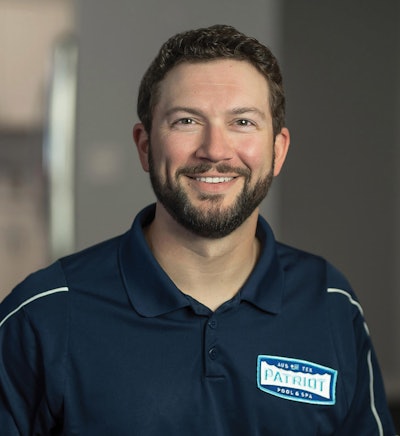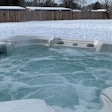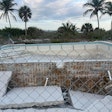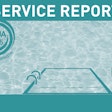
 Hal Denbar, founder, Patriot Pool and Spa, Austin, TX, and regional director for NPP.Patriot Pools
Hal Denbar, founder, Patriot Pool and Spa, Austin, TX, and regional director for NPP.Patriot Pools
Hal Denbar, founder of Patriot Pool and Spa in Austin, built his service company into a $4 million business before he was approached by National Pool Partners (NPP) to help lead their Texas region. The investor-backed consolidator works to aggregate service companies across different U.S. markets, alongside a number of organizations moving to rationalize the service industry.
As both an entrepreneur for his own company and regional director at NPP, Denbar has developed forward-thinking labor practices for pool and spa companies. AQUA spoke with him recently about the nuances of managing human beings in a tough but rewarding industry.
AQUA: You founded Patriot Pool and Spa, and you were a one-poler for some time. Was there a moment when you first thought: "I can grow this business, and I need to hire more people on my team."
HAL DENBAR: Well, there were two moments. One was theoretical, and one was real. Because when I started Patriot, that was my intention right out of the gate: to build a big company. I didn’t start just to be a guy in a truck. I enjoyed that time while I did it, but that wasn’t my goal. So in theory, it was always there. It took five years of being a one-poler before reality hit me: There just weren’t enough hours in the day to do the work. I had to make a move. And for me, that time — when we hired our very first employee — was the hardest year of my career.
AQUA: Why?
HD: Because I was trying to learn how to let go, and that was a real struggle for me. I had unrealistic expectations. I had to recalibrate. And I had to learn to delegate and trust that other people would do a good job and represent the company well.
AQUA: What are some of your strategies for getting the most out of people and helping them to feel confident on the job?
HD: Our branch manager at Patriot Austin comes to mind. He joined the team with over a decade of pool experience, but he just wanted to clean pools, even though he had more skills than that. He came in at an entry level in our company and ended up becoming a repair tech, then route manager, then repair manager, and now he’s leading the whole organization.
A big part of that was actually pushing him to meet the potential that he had. It was a matter of helping him see himself the way everybody else on the team saw him. And that was a multi-year battle of, “You can do this, man. Everybody’s expecting this of you. They see you this way. Now it’s up to you to see yourself that way so that you can actually lead the way that they’re waiting to be led.”
I think a lot of times, our biggest limitation as entrepreneurs is ourselves. We just get in our own way. For me, it was learning to trust that people are going to do the job I hired them to do. And if they don’t, the results will prove it – at that point, you can take action and let them go. But you have to step back and let them work.
At Patriot, we were really successful at finding people within the industry that may not have had a great experience with a prior employer. Granted, there’s always going to be times when you strike out, but we definitely saw success with people that I know weren’t successful at prior stops. As we brought them in, gave them the tools to do the job, and then trusted them to do the job, we’d see them flourish.
AQUA: You hear people talk about company culture. What are the key parts of company culture?
HD: Being authentic with people is one. And transparency. In our case, a huge cultural shift occurred when we started to open up our finances. We started to discuss what we were looking to do strategically at a leadership level with every person in the company. I think trusting your employees with that information helps them buy into what you’re doing. That way, you’ve got employees that feel invested in the direction of the company, as opposed to just showing up to do what they’re told to do that day.
AQUA: What makes a great leader in the pool and spa service world?
HD: That’s a good question. I don’t know if this is unique to the pool service industry, but it’s doing things the right way, in a way that people admire and want to emulate.
AQUA: We’ve been talking about your journey as a manager. How did you learn how to fire people?
HD: I think most everybody struggles with that, especially at first, if you have a heart. I do think, unfortunately, it’s a muscle that gets worked, right? And the more you do it, the easier it is to let people go, especially when it’s for a very justifiable cause.
One of the most interesting things about firing that I’ve discovered in my 15 years of being an owner is that everybody else on the team sees the person needs to be fired faster than you as the owner can see it. And the longer that person is left in the company, the more toxic the whole situation becomes, because it shows weakness as a leader to your people if you’re not doing something everybody else realizes needs to be done.
Most often we don’t act quickly enough. As owners, we think we’re being more empathetic and having a bigger heart by not letting the person go, but it’s actually penalizing everybody else in the company. And no one else on the team is looking at the owners and thinking, “Oh, they have such a great heart. They’re keeping this person around.” They’re thinking, “This owner’s an idiot. Why aren’t they firing this person that everybody else can see needs to be fired?”
That’s been my experience with it so far. Everybody else sees the field just as well as the owner does, sometimes even better, because they’re working at ground level. And so it’s important to act quickly for the health of the team.
AQUA: On the other hand, how do you recognize someone is going to be a great fit?
HD: I’d love to find a process or system that can tell you if someone is going to be a great fit. You just have to do your best to identify things in the course of an interview and during the entire hiring process. And trust your gut feeling. Does it seem like there’s buy-in? Does this person seem like they’re going to be a good fit?
That’s a huge part of building the team, getting the right person in the right seat. And sometimes you can have the right person, but you just need to find a different place in the company for them. In our experience, if we find somebody that is an incredible cultural fit, they’re going to be an asset. We just need to figure out how to use them as an asset.
AQUA: A lot of companies say they struggle with millennials…
HD: Yeah, so historically at Patriot, we focused on millennials. I’m a millennial myself. And although I don’t identify with a lot of the overarching stereotypes about millennials, I can relate to that group. Specifically, we would have flexible hours – if people had something going on outside of work, whether they were in a band or they were an artist, whatever it was they did, we focused on working around those things. We got enough out of them to justify having them as an employee, and they got enough out of the overall package to justify coming to work for us.
I can tell you that the person I look up to and admire specifically in regard to this question is Matt Gohlke with Gohlke Pools in Denton, Texas.
I remember him doing a presentation in California where he just laid it out and said, “Here are all the things that, as a man my age, make me uncomfortable as an employer, because that’s not what I would be looking for in an employer. But I’ve learned that the people I’m trying to hire, these are the very things they’re looking for.”
His ability to adapt, even though it made him uncomfortable, is just really impressive. He went down a list of all the things he does now, including having a barber shop in the office, and said, “I would’ve thought that was crazy when I was 23 and looking for a job. But we do what we gotta do.” So he’s sort of an inspiration on that piece within the industry.
AQUA: What do you have to offer people who are looking for something more than a paycheck, who are trying to start a family and build a career?
HD: I think that’s actually an incredible evolution that our industry’s experiencing right now. And clearly, I’m biased in favor of NPP, but I think it’s agnostic of NPP in terms of this new version 2.0 of the industry that we’re getting with consolidation.
I think we’re creating legitimate career paths in our industry on the service side. In a lot of other trades, they can see, “I need to get this certification, I have this career path,” while we’ve been very unstructured in the pool service industry. But I think that’s changing, and I think that’s going to attract a lot of new talent.
But it won’t happen overnight, because it’s going to take awareness out there in the job pool. However, I do think that it’s actively occurring right now. One of the things that attracted me to NPP and the idea of starting this company was that as we built our org chart, we created a career progression that could lead someone from pool cleaner to executive. That’s never existed in the industry before.
We’re just getting started, but I can’t wait for us to fully build that out, to promote it as an industry. Not just as NPP, but with these larger corporations that are going to be built within our industry. That’s one of the things I’m most excited about.
Because I think we’ll be pulling new talent into the industry. I think we’re going to retain the talent we already have, because we’re going to show them promise and a new direction that they can take in their careers. Not just locally, but nationally. And that is going to be a huge topic for our industry over the next 12 to 24 months.
This article first appeared in the February 2022 issue of AQUA Magazine — the top resource for retailers, builders and service pros in the pool and spa industry. Subscriptions to the print magazine are free to all industry professionals. Click here to subscribe.












































